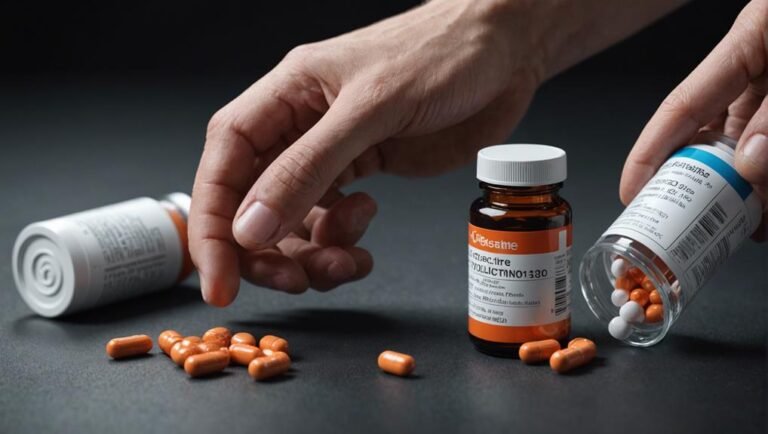Breakthrough Weight-Loss Medications: What You Should Know
Discover the effectiveness of GLP-1 receptor agonists in weight loss, stimulating insulin secretion and reducing appetite. FDA-approved medications like bupropion plus naltrexone and phentermine aid in curbing food intake. Realistic goals of losing 5% to 7% body weight are achievable with these medications when accompanied by a healthy diet and exercise. The rising popularity of GLP-1 agonists such as liraglutide shows promise in weight management. Understanding weight-loss medications' mechanisms can guide you in achieving your weight goals effectively. Further insights await on the evolving landscape of breakthrough weight-loss solutions.
Key Takeaways
- GLP-1 receptor agonists like liraglutide and semaglutide aid in substantial weight loss.
- FDA-approved weight-loss medications include bupropion plus naltrexone, phentermine, and orlistat.
- Medications work by increasing fullness, slowing gastric emptying, and reducing food intake.
- Realistic weight-loss expectations involve shedding 5% to 7% of body weight with medication, diet, and exercise.
- Long-term commitment and sustainable efforts are crucial for effective weight management.
GLP-1 Receptor Agonists: Weight-Loss Effects
When considering weight-loss effects, GLP-1 receptor agonists have demonstrated significant efficacy in aiding individuals with obesity or type 2 diabetes.
Mechanism insights reveal that these agonists work by stimulating GLP-1 receptors, leading to increased insulin secretion, decreased glucagon release, delayed gastric emptying, and reduced appetite.
Clinical trials have shown promising results, with participants experiencing weight loss ranging from 10% to 20% of their body weight. This notable impact is paving the way for GLP-1 receptor agonists to become a focal point in weight-loss interventions.
As research continues to unfold, these medications offer a beacon of hope for those struggling with obesity or type 2 diabetes, showcasing their potential to revolutionize weight-loss management strategies.
FDA-Approved Medications for Weight Loss
GLP-1 receptor agonists, known for their significant weight-loss effects, are part of the FDA-approved medications for weight loss. These drugs work by increasing feelings of fullness and slowing gastric emptying, leading to reduced food intake. Clinical trials have shown that these medications can help individuals lose between 10% to 20% of their body weight. In addition to GLP-1 receptor agonists, other FDA-approved weight-loss medications include bupropion plus naltrexone (Contrave), phentermine (Adipex-P), phentermine plus topiramate (Qsymia), and orlistat (Xenical, Alli). When combined with a healthy diet and exercise, these medications typically aid in shedding 5% to 7% of body weight. Here is a table summarizing these FDA-approved weight-loss medications:
| Medication | Mechanism Insights |
|---|---|
| GLP-1 receptor agonists | Increase feelings of fullness |
| Bupropion plus naltrexone | Appetite suppression |
| Phentermine | Appetite suppression |
| Phentermine plus topiramate | Appetite suppression, increased fullness |
| Orlistat | Blocks fat absorption |
Weight-Loss Percentage Expectations
For individuals seeking to comprehend weight-loss percentage expectations, it's important to contemplate the potential outcomes of incorporating FDA-approved medications and lifestyle changes. When considering weight loss through FDA-approved medications like GLP-1 receptor agonists, realistic goals are essential. These medications, when combined with a healthy diet and exercise, typically help individuals lose 5% to 7% of their body weight.
However, it's important to remember that long-term sustainability and weight management require ongoing effort. While some cases have shown weight loss results of 10% to 20% of body weight with GLP-1 receptor agonists, patient expectations should align with achievable and maintainable targets. Setting realistic goals and understanding the journey towards weight management are key factors in achieving successful outcomes.
Increasing Popularity of GLP-1 Agonists
The rising popularity of medications that target the GLP-1 receptors is indicative of a growing trend towards effective weight management solutions. GLP-1 agonists, such as liraglutide (Saxenda) and semaglutide (Ozempic), have gained attention for their significant impact on weight loss.
These medications, originally used for managing type 2 diabetes, have shown promising results in aiding weight loss by targeting the brain's appetite control centers. Studies have demonstrated weight loss effects ranging from 10% to 20% of body weight in many cases.
When combined with a healthy diet and exercise regimen, GLP-1 agonists can help individuals with obesity achieve substantial weight loss. The increasing use of GLP-1 agonists highlights their potential in the field of weight management.
Author Background: Matthew Solan
Matthew Solan, the executive editor of Harvard Men's Health Watch, brings a wealth of experience and expertise to the field of health journalism. With a strong focus on men's wellness, Solan has a background in reputable health publications such as UCLA Health's Healthy Years, Duke Medicine's Health News, and Weill Cornell Medical College.
His work reflects a dedication to providing reliable health information to readers, particularly in the domain of men's health and wellness. As an experienced health editor, Solan contributes valuable insights to the world of health journalism, ensuring that readers receive accurate and up-to-date information on a wide range of health topics, including weight loss, medications, and overall well-being.
Reviewer Profile: Dr. Howard LeWine
What expertise does Dr. Howard LeWine bring to his role as the Chief Medical Editor at Harvard Health Publishing?
Dr. Howard LeWine is a practicing internist at Brigham and Women's Hospital in Boston, bringing a wealth of medical expertise to his editorial roles. With his background in internal medicine and his position as the Chief Medical Editor at Harvard Health Publishing, Dr. LeWine guarantees that the health information provided is accurate, evidence-based, and trustworthy.
His commitment to delivering reliable content is reflected in his work, emphasizing the importance of accurate medical information for readers. Dr. LeWine's experience in the field of medicine and his editorial responsibilities contribute to the credibility and integrity of the health publications he oversees.
Disclaimer and Medical Advice Importance
Dr. Howard LeWine's extensive medical background and editorial role at Harvard Health Publishing guarantee the accuracy and reliability of health information, emphasizing the critical importance of seeking direct medical advice from qualified clinicians.
The disclaimer provided by Harvard Health Publishing underscores the significance of consulting with professionals before making any health-related decisions. This step is vital in ensuring that individuals receive personalized medical guidance tailored to their specific needs and conditions.
While archived content can offer valuable insights, it isn't a substitute for the expertise and individualized care provided by healthcare professionals.
Conclusion
You've learned about the exciting advancements in weight-loss medications, such as GLP-1 receptor agonists, that are changing the game for individuals looking to shed extra pounds.
With the potential to lose 5% to 20% of your body weight when combined with a healthy diet and exercise, these FDA-approved medications offer hope for those struggling with obesity or type 2 diabetes.
Take control of your health and explore these groundbreaking options to reach your weight loss goals.







